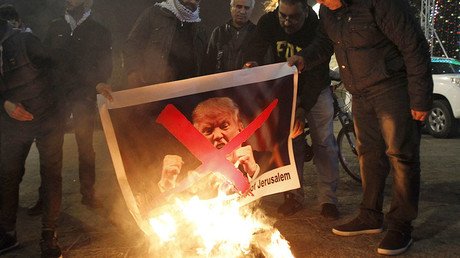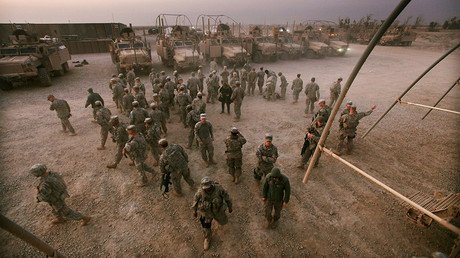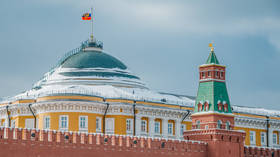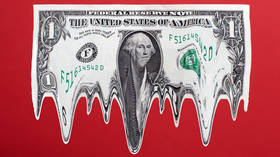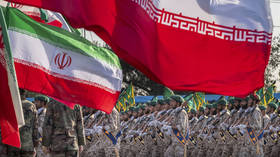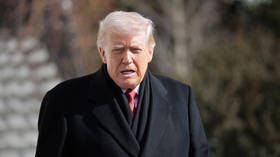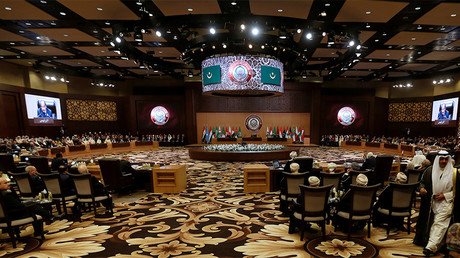City of discord: How Trump’s decision on Jerusalem throws 70yrs of caution to the wind
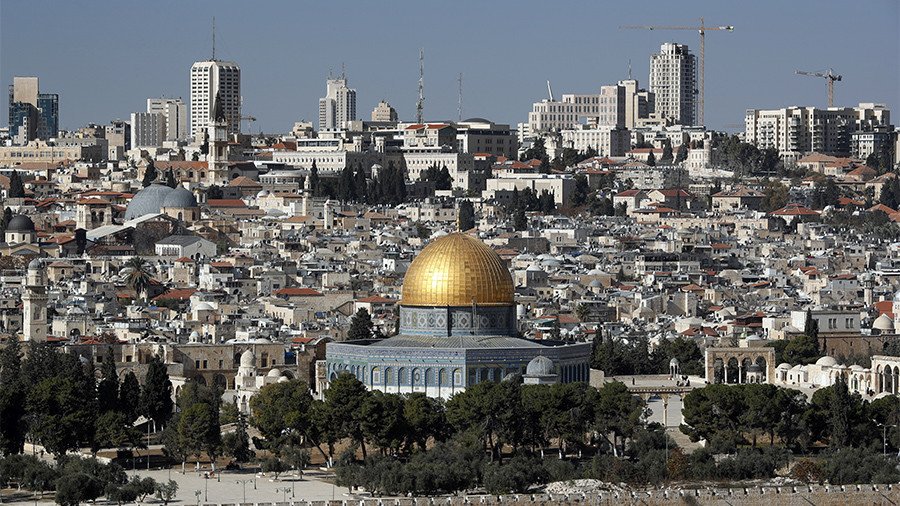
Trump’s Jerusalem decision has undone 70 years of wary American policy in relation to the Israeli-Palestinian conflict, undermining the status of the US as one of peace brokers in the region. RT looks back at how America started, trimmed and reversed its Middle East policy.
The US President Donald Trump recognized Jerusalem as the capital of Israel on Wednesday, saying that he was acknowledging “the obvious.” The move immediately provoked a wave of indignation across the Middle East, and resulted in an eruption of massive anti-American rallies. Some militant groups, including Iraq’s Shiite paramilitary group Harakat Hezbollah al-Nujaba, even went as far as threatening to take aim at the US. Turkey, which is steadily expanding its influence in the Middle East, threatened to sever diplomatic ties with Israel.
Washington’s decision marks the first time since the UN-brokered partition of Palestine in 1947 that a president of the US, a member of the Middle East Quartet – a well-known foursome of world powers mediating in the peace process between Palestine and Israel – has departed from the established policy that the issue of recognizing Jerusalem as Israel’s capital should be kept off the table.
What was America’s initial policy towards Jerusalem?
The UN-brokered 1947 partition plan for Palestine, which stipulated the creation of Jewish and Arab sovereign states and proposed a special international status for Jerusalem, proved short-lived. As Arabs rejected the partition, calling for the creation of a “unitary” state of Palestine, the young Jewish state tightened its grip on the western edge of the city, which is populated and administered mainly by Jews.
In a rare instance of unanimity between the two Cold War arch-rivals, the US and the USSR supported the UN partition plan in November 1947. A year later, Washington supported UN General Assembly Resolution 194, which called for a “permanent international regime for the territory of Jerusalem.”
Following the 1948 Arab-Israeli War, Jerusalem was divided into two parts. West Jerusalem, populated by Jews, came under Israeli rule; while East Jerusalem, populated mainly by Palestinian Muslims and Christians, fell under Jordanian control.
At the time, Washington opposed the movement of Israel’s capital from Tel Aviv to West Jerusalem, but also opposed Jordan’s announced intention to make Jerusalem its second capital in 1950, according to the Congressional Research Service (CRS).
How did the US react to Israel’s 1967 annexation of East Jerusalem?
The Israeli occupation of Jerusalem, which dates back to the 1967 Six-Day War, came as a result of yet another escalation of tensions between Israel and the neighboring Arab countries, including Egypt, Syria and Jordan. During the war, Israeli paratroopers seized Jerusalem’s Old City, which houses Judaists’ Temple Mount and the Western Wall, the Christians’ Church of the Holy Sepulcher, as well as the Dome of the Rock and al-Aqsa Mosque – two of the holiest sites for Muslims.
Israelis then declared the city “reunified.” The world powers, however, did not recognize the East Jerusalem annexation as well as other territorial gains made by Israel as a result of the war. The Soviet Union severed diplomatic ties with Israel over the issue and even the US opposed Israel’s actions, maintaining that the future of Jerusalem should be the subject of a negotiated settlement.
When and how did the US change its Jerusalem policy?
In 1995, Congress passed the Jerusalem Embassy Act, which declared that “Jerusalem should be recognized as the capital of the state of Israel.” The law envisioned a relocation of the US embassy in Israel from Tel Aviv to Jerusalem no later than 1999, but consecutive administrations gave waiver to implementing the act on security grounds. Whether colored blue or red, the White House insisted that passing the act would represent an infringement by the legislature on the executive’s power to make foreign policy.
In 2002, it was passed as part of the Foreign Relations Authorization Act, which provided: "For purposes of the registration of birth, certification of nationality, or issuance of a passport of a United States citizen born in the city of Jerusalem, the Secretary shall, upon the request of the citizen or the citizen’s legal guardian, record the place of birth as Israel.”
Ties with Israel were among the heaviest points in Trump’s electoral agenda. After he took office, the new president’s administration signaled that it could move the US embassy from Tel Aviv to Jerusalem, but has not fulfilled this promise to date.
In his statement on Wednesday, Trump called on all parties “to maintain the status quo at Jerusalem's holy sites including the Temple Mount, also known as Haram al-Sharif."
What lies ahead for Jerusalem and the US?
Trump’s decision is a major blow for the US image in the Arab world. It completely removes Washington from its longstanding role as a broker of Middle Eastern peace effort, a position that Washington had tried to monopolize. President of the Palestinian Authority Mahmoud Abbas said that Trump’s declaration meant that the US “abdicates” any role in mediating the Arab-Israeli conflict. In a televised speech, Abbas said he “condemned and rejected” the US decision, which he said will “serve terrorists” and “bring never-ending wars to the region.”
'We are coming, #Jerusalem! We will not concede of one sand!' - #Hamas takes on #Trump as rage mounts in #Gazahttps://t.co/DN2bBGRthGpic.twitter.com/AfQR4SSTPD
— RT (@RT_com) December 8, 2017
Ismail Haniyeh, the leader of Hamas, has called for a “new intifada in the face of Israel,” while Iraq has demanded that the US reverses its decision to recognize Jerusalem as Israel’s capital.
Bracing for the worst, the US State Department alerted embassies in predominantly Muslim nations around the world of a possible violent backlash. Some observers said the scale of security fears has been unseen since 2003, when the US decided to invade Iraq.
The fears may be well justified, considering what happened during the last world-wide anti-American protest. In 2012, as Muslims were expressing rage over a slanderous amateur film published on YouTube, a militant group used the distraction to attack the US diplomatic mission in Benghazi, Libya, killing Ambassador Christopher Stevens, two CIA operatives and an information officer. Happening less than a year after the US helped Benghazi armed groups to oust the country’s longtime leader Muammar Gaddafi, the attack came as a shock for America.
Trump’s decision on Wednesday might fuel the perception of Washington as an unfair arbiter, critics say. However, a lasting Palestinian-Israeli peace accord was elusive long before Trump came to office. In 2013, when the US foreign policy was steered by Barack Obama, and John Kerry marshalled the American diplomatic corps, King Abdullah II of Jordan – the country entrusted to be the custodian of Muslim holy sites in Jerusalem – told The Atlantic’s Jeffrey Goldberg that he felt the moment of truth for the Arab-Israeli peace may have been missed. “This is the last moment [...] Can it be achieved in four years? Are we too late? After four years, it’s over,” the monarch said.
Four years on, Trump did what he did.
